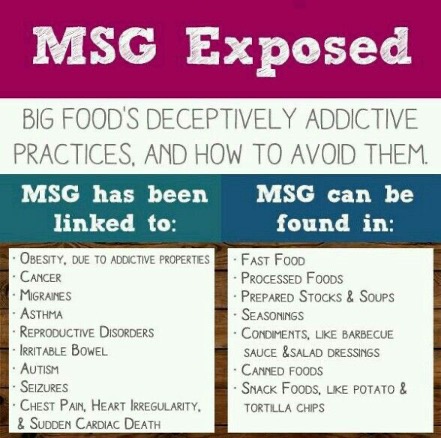Written by Ciara Mitchell, PhD, RDN, LD – May 9, 2025
This month, the CCTS Bionutrition Unit is launching a myth-busting series designed to challenge common nutrition beliefs by separating evidence-based facts from widespread misconceptions. In this article, we examine the health claims surrounding MSG, drawing on current research and expert opinions.
What is MSG?
 Monosodium Glutamate (MSG) is a common food additive that enhances the savory taste in foods. MSG is a compound formed by sodium and glutamate (or glutamic acid), a naturally occurring non-essential amino acid found in many foods such as tomatoes, anchovies, seaweed, cheeses, and meats. Consumed alone, MSG is odorless and does not have a flavor, but when added to other foods or ingredients, it produces a meaty, savory taste, also known as umami, the fifth taste in addition to salty, sweet, sour, and bitter.
Monosodium Glutamate (MSG) is a common food additive that enhances the savory taste in foods. MSG is a compound formed by sodium and glutamate (or glutamic acid), a naturally occurring non-essential amino acid found in many foods such as tomatoes, anchovies, seaweed, cheeses, and meats. Consumed alone, MSG is odorless and does not have a flavor, but when added to other foods or ingredients, it produces a meaty, savory taste, also known as umami, the fifth taste in addition to salty, sweet, sour, and bitter.The History of the MSG Controversy
Traditionally, a frequent component of Asian cuisine, the rise of MSG consumption has significantly increased globally over the past 30 years. However, MSG has received a bad reputation in several media outlets as a “toxic ingredient” that is harmful to health.In the late 1960’s a letter written by physician Robert Ho Man Kwok was published in the New England Journal of Medicine claiming that Chinese foods caused a group of symptoms such as headaches, numbness, and dizziness, due to its use of MSG, terming these group of symptoms as the “Chinese Restaurant Syndrome”. Although this article was determined to be deceptive, news about this claim traveled, spreading fear and concern for consumers and researchers.
The term ‘Chinese Restaurant Syndrome’ was believed by many to be a racist term and after campaigns to remove this terminology, the name was changed to ‘MSG symptom complex’ although, it’s been noted by scientists that there is little to no evidence linking MSG to harmful side effects.
What does Research Demonstrate?
Most clinical studies examining the adverse effects of MSG have been conducted in animals and insects, such as rats, mice, rabbits, and fruit flies. Research involving human populations has been limited and primarily consists of cross-sectional observational studies conducted in Asian countries. Furthermore, these studies often associated negative outcomes with high doses of MSG—levels far beyond what is typically consumed in a normal diet. In many cases, MSG was also administered in isolation, which does not reflect how it is normally consumed in real-world dietary contexts.What do experts say?
 According to the U.S. Food and Drug Administration (FDA), MSG is considered safe when consumed in moderation. However, they caution that excessive intake may be linked to potential adverse effects involving the circulatory, cardiac, muscular, neurological, and gastrointestinal systems. The World Health Organization (WHO) has set a recommended daily intake limit of 120 mg per kilogram of body weight—which equates to about 8,160 mg (8.16 grams) per day for a 150-pound adult. In comparison, the average American consumes up to 500 mg of MSG per day from ultra-processed and restaurant foods, a level well below the established safety threshold.
According to the U.S. Food and Drug Administration (FDA), MSG is considered safe when consumed in moderation. However, they caution that excessive intake may be linked to potential adverse effects involving the circulatory, cardiac, muscular, neurological, and gastrointestinal systems. The World Health Organization (WHO) has set a recommended daily intake limit of 120 mg per kilogram of body weight—which equates to about 8,160 mg (8.16 grams) per day for a 150-pound adult. In comparison, the average American consumes up to 500 mg of MSG per day from ultra-processed and restaurant foods, a level well below the established safety threshold.Fact or Fiction “MSG is bad for your health”
FICTION. Safe levels of MSG consumption have not been linked to adverse health effects. However, MSG is commonly found in ultra-processed foods, which are often high in salt, fat, and added sugars. When consumed in excess, these types of foods can contribute to obesity and related health issues. Although MSG contains sodium, research shows that using MSG to enhance flavor—instead of table salt—does not negatively impact blood pressure. In fact, it may serve as a better alternative for individuals aiming to reduce their overall sodium intake.Join us in exploring the transformative power of nutrition science with the CCTS Bionutrition Unit, fostering collaboration and enhancing efforts to improve patient care and outcomes. Subscribe to the weekly CCTS Digest to stay updated on this on-going campaign, CCTS In Focus: Bionutrition, as well as upcoming CCTS events.
References:
- Kayode, O. T., Bello, J. A., Oguntola, J. A., Kayode, A. A. A., & Olukoya, D. K. (2023). The interplay between monosodium glutamate (MSG) consumption and metabolic disorders. Heliyon, 9(9), e19675. https://doi.org/10.1016/j.heliyon.2023.e19675
- Wahlstedt, A., Bradley, E., Castillo, J., Burt, K., (2021). MSA is a-ok: exploring the xenophobic history of and best practices for consuming monosodium glutamate. Professional practice. Journal of the Academy of Nutrition and Dietetics. https://doi.org/10.1016/j.jand.2021.01.020